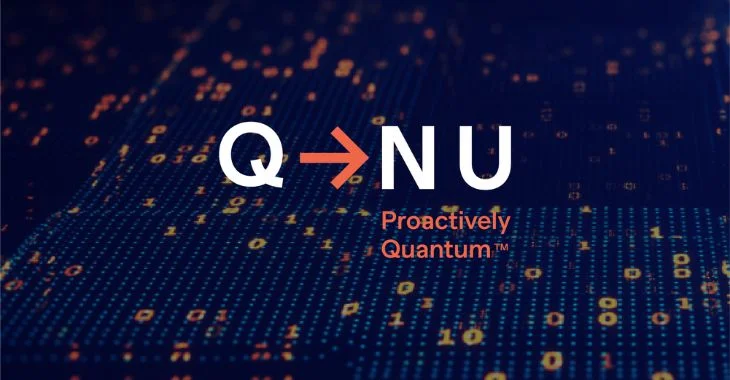
Part 6 of Tech That Matters
In 2016, four innovators at the IIT Madras Research Park — Sunil Gupta, Srinivasa Rao Aluri, Mark Mathias, and Anil Prabhakar — set out to solve a critical global problem. Cybersecurity was evolving fast, but attackers and defenders were still using the same toolkit. This, they believed, was the core issue. Their answer? Quantum physics. That’s how QNu Labs was born — on a mission to give defenders a true edge by building quantum-safe cybersecurity tools.
In this week’s Tech That Matters series, we explore how QNu is changing the cybersecurity landscape.
Sunil Gupta, the CEO, sums it up: “No matter how much you spend on traditional security, the problem doesn’t get solved if both sides use the same tools.”
Why traditional encryption is running out of time?
Today’s digital systems rely heavily on cryptographic protocols like RSA (Rivest–Shamir–Adleman) and ECC (Elliptic Curve Cryptography) to protect sensitive data. These methods depend on solving complex mathematical problems. For example, RSA relies on the difficulty of factoring large prime numbers, while ECC uses the challenge of solving elliptic curve equations.
For classical computers, these problems are extremely hard and time-consuming. But quantum computers—powered by qubits instead of bits—could solve them exponentially faster. When that day arrives (often referred to as Q-Day), current encryption standards will be cracked wide open. That’s the digital doomsday QNu Labs is working to prevent.
Launching QShield: Built in India, made for the world
On World Quantum Day, QNu Labs unveiled QShield, a cloud-based quantum-safe cybersecurity platform. Designed for critical infrastructure and high-risk environments, QShield helps organisations secure their data using algorithms resistant to quantum attacks.
What sets QShield apart is its flexibility. Whether a business operates in the cloud, on-premises, or across hybrid systems, the platform adapts. It simplifies the complex task of managing cryptographic keys and data security in one integrated system. It even includes services like quantum key generation, encrypted connectivity, and secure collaboration — ensuring security is baked into every communication channel.
Designing quantum chips in Bengaluru
Unlike most cybersecurity firms that import their hardware, QNu Labs manufactures its quantum security chips in India. These chips use the principles of quantum mechanics to detect tampering and generate truly random encryption keys — essentially creating a new “root of trust” that attackers can’t predict or reverse-engineer.
These chips power QNu’s growing range of products, including Tropos (a quantum random number generator), Armos (a quantum key distribution system), and QVPN, which uses post-quantum algorithms to secure even Wi-Fi connections. The technology is already in use by DRDO, WESEE, defence PSUs, and global clients.
Securing India’s defence infrastructure
QNu Labs is not just experimenting — it’s delivering real-world results. In 2022, the startup completed a 150-km Quantum Key Distribution (QKD) system trial with the Indian Army. QKD uses the behavior of quantum particles to transmit encryption keys that cannot be intercepted without detection.
In 2023, QNu introduced a quantum-secure VPN, protecting wireless military networks. By 2024, the Indian Navy had received 25 QKD systems from QNu Labs, marking a huge leap in quantum-secure communication in India.
National Quantum Mission recognises QNu’s role
The Government of India has taken notice. QNu Labs was selected under the National Quantum Mission (NQM) to help build the world’s first end-to-end, heterogeneous quantum communication network. This Made-in-India network will include free-space QKD, indigenous single-photon detectors (SPD), encryptors, quantum HSMs, and a software-defined controller.
This project positions QNu Labs not just as a key national player — but as a potential global leader in secure quantum communication.
The financial threat: ₹10 trillion at stake
The stakes are high. Regulators like SEBI oversee institutions that process trillions of rupees in sensitive financial data. Without proactive upgrades to quantum-safe security, Q-Day could lead to massive data breaches, risking the integrity of India’s financial sector.
QNu Labs recommends a clear path forward — first, assess vulnerabilities and identify critical data. Then, audit encryption methods and begin pilot testing quantum-safe technologies like Post-Quantum Cryptography (PQC) and QKD. This ensures a smooth, secure transition without disrupting ongoing operations.
Leading India into the quantum era
QNu Labs is doing what few Indian startups dare to attempt — building hardware, software, and complete ecosystems for a future that doesn’t yet exist but is rapidly approaching. Its journey — from a research park startup to a defence-grade technology leader — proves that Indian deeptech is ready for the global stage.
At a time when the world is searching for answers to next-gen cyber threats, QNu Labs offers more than just hope. It offers action. This is innovation rooted in physics, crafted with precision, and focused on a safer digital tomorrow.
This story is a part of our weekly series on tech innovations that matter!
